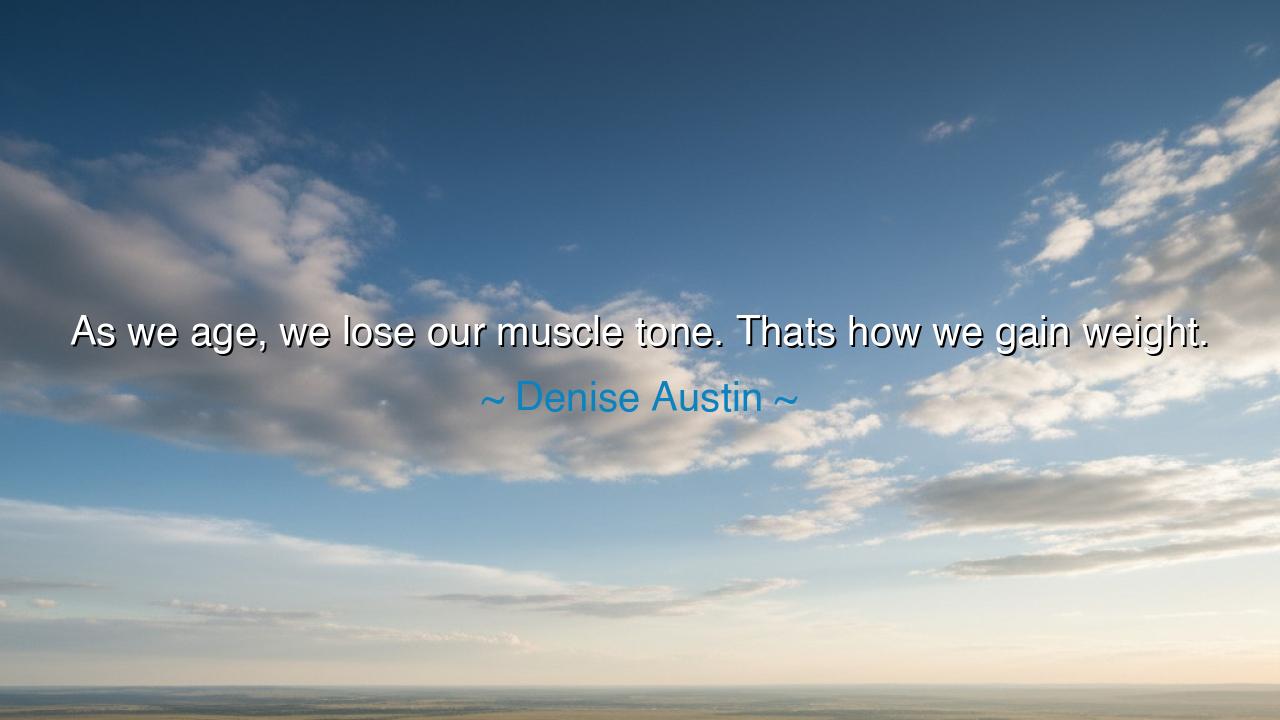
As we age, we lose our muscle tone. Thats how we gain weight.






In the inevitable march of time, we are bound by the laws of nature. Denise Austin, with a deep understanding of the human body, offers this keen observation: "As we age, we lose our muscle tone. That's how we gain weight." This simple truth speaks not only to the physical changes that come with aging, but to the very nature of our relationship with the body we inhabit. Muscle tone, the firmness and strength of our muscles, is the foundation of our physical vitality. As we grow older, the loss of muscle tone is a natural part of the aging process, but it also marks a deeper shift in the balance between strength and weakness, between movement and stillness.
The ancients understood that the body was a vessel that, like any great work of art or tool, required care and attention to maintain its strength and integrity. Homer, in his epic tales, described the great heroes as men and women of immense strength, whose muscles were honed through years of training and battle. But even the mightiest warriors could not escape the passage of time. The wisdom of the ages tells us that youth is like the dawn—brilliant, vibrant, and full of promise—but with the setting sun comes the decline of youth’s energy, the wearing of the body’s strength. Aging is the great equalizer; even the gods themselves, in their way, must face the inevitable pull of time.
In Homer’s Iliad, we see the hero Achilles, at the peak of his powers, who, despite his near invincibility, was not immune to the forces of fate. He, like us, faced a challenge that could not be overcome with strength alone. As the years pass, we too must reckon with the fragility of our bodies. The muscle tone that once carried us through the trials of life, whether physical or emotional, gradually diminishes. This loss of muscle tone is not just a matter of physicality, but a reflection of the changing demands placed on the body and soul over the years. As the seasons of life change, so too must our approach to maintaining vitality.
However, as Denise Austin points out, the loss of muscle tone does not simply result in a physical transformation; it also brings about a shift in how we relate to weight—not just physical weight, but the weight of years, of experience, and of burden. As our muscles weaken, our body’s capacity to burn energy diminishes, and thus, the weight we once carried with ease begins to accumulate. This is not only a metaphor for the body but a truth about life itself: as we grow older, we carry more than just the physical weight of age; we carry the emotional and psychological weight of the experiences we’ve lived through. The challenge is to find balance, to maintain strength both physically and mentally, to keep from being overwhelmed by the weight of time.
This is not to say that aging is a journey of inevitable decline. Indeed, the ancients believed that wisdom and strength could coexist in the later years of life. Consider the example of Socrates, whose body may have aged, but whose mind grew ever more sharp with each passing year. Socrates' wisdom was not built on physical prowess alone, but on the power of thought, the discipline of reflection, and the strength of his convictions. As Austin suggests, our muscles may weaken, but our strength of character can grow even stronger with time. Aging is not a failure; it is an opportunity for growth in new and unexpected ways.
The lesson here is that while the loss of muscle tone may seem like an unfortunate inevitability, it need not lead to weight gain in the broader sense of our lives. Just as Achilles sought redemption in the face of his inevitable death, we too must seek ways to adapt to the changes that come with aging. The key is to stay active, not just in the physical sense, but in the pursuit of meaning, in the search for strength that transcends the physical realm. Through regular exercise, through mental stimulation, and through a life of purpose, we can slow the decline, and even find ways to reverse the loss of strength—both physical and emotional.
Let us then live with intention. Let us care for our bodies, not just by exercising to preserve our muscle tone, but by feeding our minds and spirits with wisdom and growth. Just as the ancients taught that the body and soul must work in harmony, so too must we maintain balance in our own lives. Denise Austin’s words remind us that aging, while inevitable, does not mean resignation. The challenge is to adapt, to continue to pursue strength even as our bodies change, and to find the vitality that lies within us, no matter our age.






AAdministratorAdministrator
Welcome, honored guests. Please leave a comment, we will respond soon